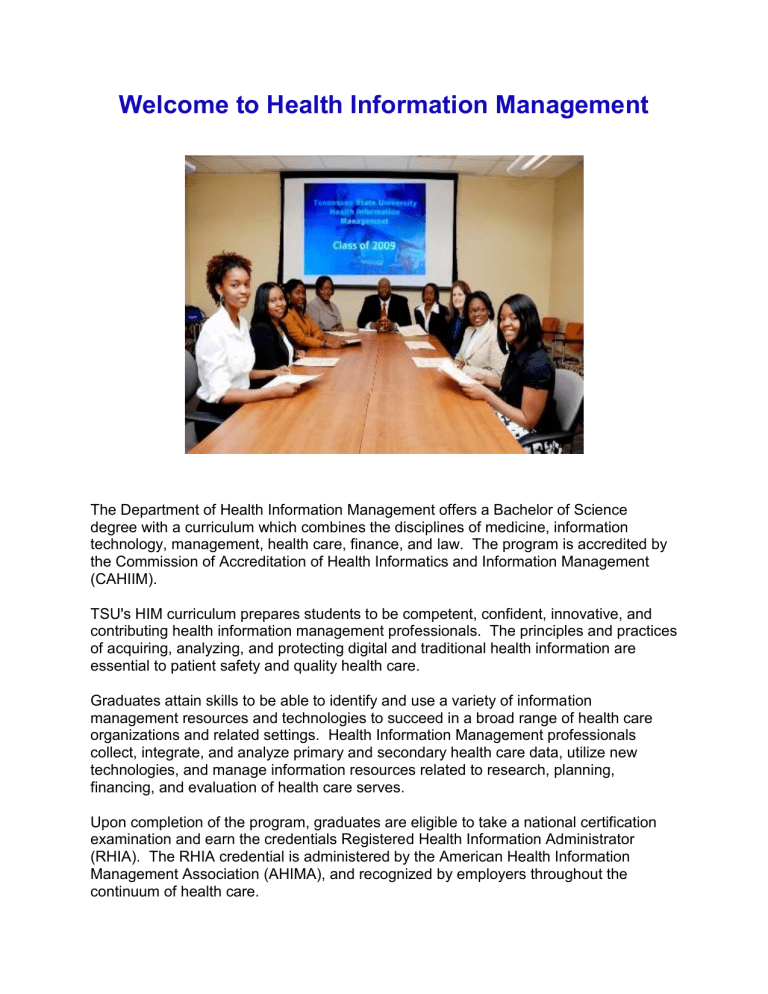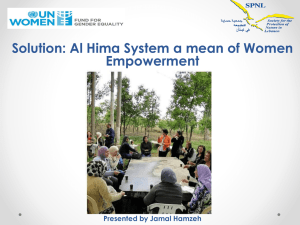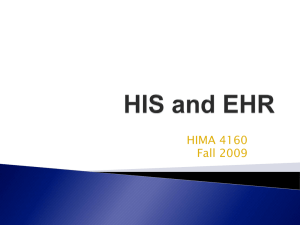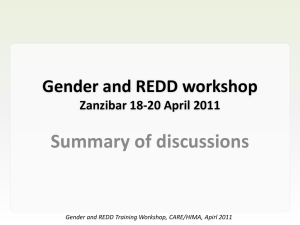HIM Department Handbook - Tennessee State University

Welcome to Health Information Management
The Department of Health Information Management offers a Bachelor of Science degree with a curriculum which combines the disciplines of medicine, information technology, management, health care, finance, and law. The program is accredited by the Commission of Accreditation of Health Informatics and Information Management
(CAHIIM).
TSU's HIM curriculum prepares students to be competent, confident, innovative, and contributing health information management professionals. The principles and practices of acquiring, analyzing, and protecting digital and traditional health information are essential to patient safety and quality health care.
Graduates attain skills to be able to identify and use a variety of information management resources and technologies to succeed in a broad range of health care organizations and related settings. Health Information Management professionals collect, integrate, and analyze primary and secondary health care data, utilize new technologies, and manage information resources related to research, planning, financing, and evaluation of health care serves.
Upon completion of the program, graduates are eligible to take a national certification examination and earn the credentials Registered Health Information Administrator
(RHIA). The RHIA credential is administered by the American Health Information
Management Association (AHIMA), and recognized by employers throughout the continuum of health care.
If you have an interest in health care and information technology, health information management may be the right career choice for you. As one of the fastest growing industries, a career in Health Information Management places you right where the expanding arena of healthcare meets the cutting edge of technology.
HIM Brochure
A Message from the Program Director
Welcome to the Health Information Management Program in the College of Health Sciences at Tennessee State
University where students matter most. Your decision to make a career transition to the field of Health Information
Management is a fantastic choice.
Health Information Management (HIM) is dynamic in an ever-changing world of healthcare. Computerization and legislative action have a great significance in the HIM profession. I strongly encourage you to be part of this profession which soars higher, dreams larger, grows stronger, climbs farther, and inspires others to manage healthcare data and protect the privacy and security of health information. Additionally, as one of the fastest growing occupations in the health care industry, a career in HIM places you right at the intersection where health care meets the cutting edge of technology.
Healthcare + Technology = Success for You
I hope this website provides an answer to your inquiry. If you have questions or need additional information, contact me at ekunnu@tnstate.edu
, or by phone at 615-963-
7441. The Health Information Management department is currently located in the Tom
Jackson Industrial Technology Building on the third floor, Room 314.
Best wishes,
Elizabeth I. Kunnu, Ed.S, M.Ed, RHIA, CPAR
Faculty & Staff
Elizabeth Kunnu
Ed.S, M.Ed, RHIA, CPAR
Department Head
Assistant Professor
Tel: 615-963-7441
E-mail ekunnu@tnstate.edu
Valerie Brock
MBA, RHIA, CPC, CPAR
Assistant Professor
Tel: 615-963-7429
E-mail vbrock@tnstate.edu
Edilberto Raynes, MD
Assistant Professor
Tel: 615-963-2190
E-mail eraynes@tnstate.edu
Jalanna Taplin
MSA, RHIA, CCS
Adjunct Faculty
Tel: 615-963-7441
Email jtaplin@tnstate.edu
Kawonia P. Mull, MD, PHD
Adjunct Faculty
Tel: 615-963-7441
E-mail kmull@tnstate.edu
Brittney Cosby
Administrative Assistant
Tel: 615-963-7441
E-mail bcosby@tnstate.edu
Habeeb Kotun, MS
Technical Assistant
Tel: 615-963-7441
E-mail hkotun@tnstate.edu
Elizabeth Kunnu, Ed.S, M.Ed. RHIA, CPAR
Office location
Jackson Industrial Art Building
3500 John A. Merritt Boulevard
Office phone
615-963-7441
E-mail address ekunnu@tnstate.edu
Academic Appointment
Assistant Professor, Department Head
Education
Ed.S., Educational Administration & Supervision, Tennessee State University
M.Ed., Educational Administration & Supervision, Tennessee State University
B.S., Health Information Management, Western Kentucky University
Credentials
Registered Health information Administrator (RHIA)
Certified Patient Account Representative (CPAR)
Courses Recently Taught
HIMA 4400 Organization and Management of Health Information Services
HIMA 3020 Current Trends in Health Information Management
HIMA 4000 Computerized Health Information Management Systems
HIMA 4424 Management Professional Practice in Health Information Management
HIMA 4430 Management Professional Practicum Seminar
Research Interests
Factors Influencing the Career Choice of Health Information Management Students
Professional Activities
Memberships: AHIMA, THIMA, MTHIMA
Valerie Brock, MBA, RHIA, CPC, CPAR
Office location
Jackson Industrial Art Building
3500 John A. Merritt Boulevard
Office phone
615-963-7429
E-mail address vbrock@tnstate.edu
Academic Appointment
Assistant Professor
Education
B.S., Medical Records Administration, Tennessee State University
M.BA., Business Administration, University of North Alabama
Credentials
Registered Health Information Administration (RHIA)
Certified Professional Coder (CPC)
Certified Patient Account Representative (CPAR)
Courses Recently Taught
HIMA 1010 Introduction to Health Records
HIMA 1040 Medical Terminology
HIMA 2020 Foundation to Health Information Systems
HIMA 2200 Legal & Ethical Aspects
HIMA 2300 Alternative to Health Records
HIMA 2350 Basic ICD-9-CM Coding
HIMA 2400 Basic CPT/HCPCS Coding
Professional Activities
American Health Information Management Association
Tennessee Health Information Management Association
Middle Tennessee Health Information Management Association
American Academy of Professional Coders
Assembly of Education (AOE) of the American Health Information Management
Edilberto Raynes, M.D.
Office location
Jackson Industrial Art Building
3500 John A. Merritt Boulevard
Office phone
615-963- 2190
E-mail address eraynes@tnstate.edu
Academic Appointment
Assistant Professor
Education
Doctor of Medicine - University of the city of Manila, Philippines
B.A., Psychology - De La Salle University
Pursuing a Ph.D. in Public Health specializing in Epidemiology Walden University
Courses Recently Taught
Pathophysiology Neuroscience
Physiology
Pharmacology
Medical Terminology
Research Interests
Childhood Obesity
Infectious diseases
Environmental Health
Community Research
International Research
Articles Written
Knowledge, Attitude, and Practices on Diarrheal Management
The Effects of Different Strategies of Mnemonics and Types of Music
On Learning Performances among Freshman High School Students
Jalanna Taplin, MSA, RHIA, CCS
Office Location
Jackson Industrial Art Building
3500 John A. Merritt Blvd
Office Phone
615-963-7441
Email address jtaplin@tnstate.edu
Academic Appointment
Adjunct Faculty
Education
MSA, Administration concentration in Health Services Administration, Central Michigan
University
B.S., Health Information Management, Ferris State University
Courses Recently Taught
Advance Coding
Healthcare Billing
CPT/HCPC
Introduction to Health Records
Kawonia P. Mull, M.D., PhD
Office location
Jackson Industrial Art Building
3500 John A. Merritt Boulevard
Office phone
615-963- 7441
E-mail address kmull@tnstate.edu
Academic Appointment
Professor (Adjunct)
Education
Doctor of Medicine, St. Matthews University, Grand Cayman Island
Ph.D., Physiology, Meharry Medical College
M.A., Biology, Fisk University
B.S. Microbiology, University of Arkansas
Courses Recently Taught
Medical Terminology
Medical Pathophysiology
Research Interests
Cardiovascular
Public Health
Articles Written
The Effects of Potassium Channels Modulator on Myocardial Tissue
The Role of Action Potential Shortening in Prevention of Arrhythmia in Canine
Cardiac Tissue
Admission and Retention Requirements
There are two options available to students interested in the Health Information
Management program. Option 1 is for freshmen and transfer students. Option 2 is for students who have completed an associate degree in Health Information
Technology.
OPTION 1
Requirements for Freshmen Students
High School graduation with a minimum cumulative grade point average of 2.5 on a
4.0 scale or G.E.D scores of 50 or above for the five subjects tested.
A minimum composite test score of 19 on the ACT. (This may change according to
University entrance requirements.)
First-time freshmen are required to have successfully completed any remedial or developmental courses before consideration for unconditional admission into the HIM program.
Requirements for Transfer Students
Applications will be accepted from students transferring from other colleges, universities or other departments at Tennessee State University.
Transfers, students changing their major to HIM, and continuing students are required to have successfully completed any remedial or developmental courses before consideration for unconditional admission into the program.
Applicants must have a minimum cumulative grade point average of 2.5 on a 4.0 scale.
Students transferring from other departments within Tennessee State University are required to complete a change-of-major form.
OPTION 2
Advanced Standing
Students who already have a degree in health related and any other fields may be admitted to the program if they meet admission criteria.
Individuals who have an associate degree in medical record/health information technology and who are interested in receiving a baccalaureate degree in Health
Information Management must have completed a minimum of 60 semester credit hours including directed professional practice.
These individuals are required to complete general education requirements for a
Bachelor of Science degree, as well as management, sciences, other prerequisite courses for the program and all the 3000-4000 level courses as indicated in the curriculum.
ADDITIONAL REQUIREMENTS
Submission of application to the program is due by June 30 for Fall semester and
December 1 for Spring semester.
Two letters of recommendation from persons (non-family member) who know the applicant.
A personal interview conducted by Admission and Retention Committee or its designee.
Applicants will be informed of the final decisions regarding acceptance into the program.
Students are responsible for transportation expenses and other costs relating to professional practice experience and field trips.
Students are responsible for physical examination, malpractice insurance, criminal background check and drug test prior to professional practice rotations.
Students are responsible for maintaining acceptance of professional practice rotation in and out of state health care facilities.
Students are encouraged to complete a maximum of 20 volunteer hours in a medical record or health information management department at any health care facility prior to or during the first semester of enrollment in the program. Students with work experience in the HIMA field may provide evidence in writing from the health care facility.
Students are required to complete these courses: ENGL 1010 & 1020 with minimum grades of C; three hours of college mathematics; HIST 2010 and 2020 or 3410; at least eight hours of natural science ; and nine hours in Humanities and/or Fine Arts, including three hours of English
Literature prior to their junior year.
Criminal Background Check
A criminal background check and drug test may be required at some affiliated clinical sites for training. Based on the results of the check an affiliated clinical site may determine to not allow your presence at their facility. This could result in your inability to successfully complete the requirements of this program. Additionally, a criminal background may prelude licensure or employment.
Retention Policy
The Health Information Management program retention policy requires the following:
Students must maintain a minimum cumulative grade point average of 2.0
Students must earn C or better in all major courses, supporting Science, Business,
Health Care Administration, English, and Mathematics courses. Failure to maintain in any of these courses will result in repeating the course the next semester the course is offered with approval of the advisor.
Minor in Business
Students who have completed these courses (ACT 2010, ECON 2010, MGMT 3010,
MGMT 4030, and BISI 3230) in HIM curriculum and are interested in getting minor in general business may contact the College of Business for detailed information.
Alumni
– Testimonials
Cecilia Ehiemua, M.S., B.S., RHIA
HIM Director, Matthew Walker Comprehensive Health Center
“The HIM Program at TSU opened a whole new world for me and provided the training and skills necessary to face day-to-day challenges.
”
Pat Freeman, BBA, MS, RHIA
HIM Director & QAI Coordinator, Healthcare Center of West Meade Place
“I am part of a dynamic health care team that influences positive patient care outcomes and my facility bottom line.
”
Anne Dixon, RHIA
HIM Manager, Vanderbilt University Medical Center
“I felt well prepared to take the RHIA exam, and the HIM program gave me the tools and credentials that allowed me to advance more rapidly in my profession. HIM program also helped me to network with other HIM professionals throughout the state of Tennessee.
”
Emmlee Gray, RHIA, CPAR
AIM Healthcare
“I enjoyed and loved the field of healthcare, but I didn't really enjoy hands on patient care. TSU HIM program allowed me to excel in a career that taught me skills in presenting, management, quality performance and the electronic health record. I was able to pass my certification exam within four months after graduating because the HIM director and staff helped and encouraged me to study. I would recommend this program to anyone.
”
Professional Practice Experience
An important aspect to fulfill degree requirements of the Health Information
Management program is the supervised student internship.
These vital hands-on professional practice experiences reinforce classroom learning and assist students in bridging the gap from the educational environment to employment.
National figures indicate that approximately forty-five (45%) percent of HIM students receive job offers directly from their professional practice sites. The Department of
Health Information Management has professional practice affiliation agreements for student internships with numerous healthcare organizations in the Middle Tennessee
Area. Some of these sites include:
Bordeaux Long Term Care
Centennial Medical Center
Maury Regional Hospital
Matthew Walker Comprehensive Health Center
Meharry Medical Group
Nashville General Hospital
Southern Hills Medical Center
StoneCrest Medical Center
Sumner Regional Medical Center
The Health Center at Richland
Vanderbilt University Medical Center
Veteran Affairs (VA) Medical Center
Williamson Medical Center
Student Resources
Bookstore
Campus Map
Financial Aid
On-Campus Housing
Student Handbook
HIM Department Handbook
Student Services
Student Webmail
Tuition & Fees
Undergraduate Catalog
Commencement Details
Service Learning
Curriculum
General Core Requirements:
A minimum of 69 semester hours including: ACCT 2010; HLSC 1000; BISI 2150; BISI
3230; BIOL 2210, 2211, 2220, 2221; CHEM 2500; ENGL 1010, 1020; HCAP 4500,
4900; HIST 2010, 2020; MATH 1110; MGMT 3010, 4030; PHIL 1030; COMM 2200;
ECON 2010; SOCI 3000; Humanities/Fine Arts Elective (3 semester hours); Social
Science Elective (3 semester hours); English Literature 2010/2024 (3 semester hours).
Departmental Requirements For Bachelor of Science in Health Information
Management:
Semester hours: 51
Major Core: A minimum of 51 hours including HIMA 1010, 1040, 2020, 2100, 2200,
2250, 2300, 2350, 2400, 2704, 3010, 3020, 3030, 3300, 4000, 4400, 4424, and 4430.
Students who have completed these courses (ACCT 2010, ECON 2010, MGMT 3010,
MGMT 4030, BISI 3230) in the HIM curriculum and are interested in receiving a minor in general business, may contact the College of Business for detailed information.
Suggested Four-Year Plan
(For students entering at freshman level)
Bachelor of Science Degree in Health Information Management
FALL SEMESTER
PLAN I
FRESHMAN YEAR
Cr.
Hrs.
SPRING SEMESTER
1 ENGL 1020 Freshman English II
Cr. Hrs.
3 HLSC 1000 Orientation to Health
Sciences
ENGL 1010 Freshman English I
MATH 1110 College Algebra
3
3
HIST 2010 American History I
BIOL 2220/2221 Anatomy &
Physiology II
4/0 ACCT 2010 Principles of Accounting
3
4/0
3 BIOL 2210/2211 Anatomy &
Physiology I
BISI 2150 Microcomputer
Applications
Total
3 HIMA 1010 Intro. to Health Records
14 Total
1
14
FALL SEMESTER
COMM 2200Oral Communication
SOPHOMORE YEAR
Cr.
Hrs.
3
SPRING SEMESTER
Soc. Behav. Sci. Elective (2000
Level)
HIST 2020 American History II
SOCI 3000 Social Statistics
HIMA 1040 Medical Terminology
PHIL 1030 Intro. to Philosophy
Total
3
3
3
3
BISI 3230 Management Info.
Systems
Humanities/Fine Arts (1000 -2000 level)
ENGL LIT. English Literature
ECON 2010 Intro. to Economics
15 Total
Cr. Hrs.
3
3
3
3
3
15
CHEM 2500 Intro. to Pharmacology
Total
FALL SEMESTER
MGMT 3010 Mgt. & Org. Behavior
HIMA 2020 Foundations of HIM
HIMA 2100 Fundamentals of
Medical Science
HIMA 2200 Leg/Ethical Aspects of
HIM
HIMA 2250 Hlth. Statistics & Analysis
JUNIOR YEAR
Cr.
Hrs.
3
SPRING SEMESTER
3
3
MGMT 4030 Human Resources
Management
HIMA 2300 Alter. Hlth. Record
Systems
HIMA 2350 2350
Coding/Classification of Health. Data
2
2
HIMA 2400 HIMA 2400 CPT/HCPCS
Coding
HIMA 3030 Quality Asses. &
Performance Improvement
3
16 Total
Cr. Hrs.
3
3
3
3
3
15
SUMMER SESSION
HIMA 2704 Directed Professional Practice in HIM Services 3
Total 3
FALL SEMESTER
HIMA 3010 Health Care Billing
HIMA 3020 Current Issues in HIM
SENIOR YEAR
Cr.
Hrs.
2
SPRING SEMESTER
3
2
HIMA 4424 Mgmt. Professional
Practice in HIM
HIMA 4430 Mgmt. Prof. Practice
Seminar
HCAP 4900 Health Research HIMA 3300 Adv. Coding &
Classification
HIMA 4000 Computerized HIM
System
HIMA 4400 Org. Mgmt. of Hlth. Info.
Service
HCAP 4900 Health Care Finance
Total
3
3
3
16 Total
Total Hours for Degree Requirements: 120 cr. hrs.
Cr. Hrs.
6
3
3
12
Suggested Two -Year Plan Option
(F or students with Associate’s Degree in Health Information Technology)
PLAN II
All general education requirements of the University must be met
FALL SEMESTER
ACCT 2010 Principles of Accounting
HIST 2020 American History II
ECON 2010 Intro. to Economics
CHEM 2500 Intro. to Pharmacology
HIMA 3010 Healthcare Billing
JUNIOR YEAR
Cr.
Hrs.
SPRING SEMESTER
3
3
3
3
2
Humanities/Fine Arts
SOCI 3000 Social Statistics
PHIL 1030 Intro. to Philosophy
HIMA 3030 Qual. Asses. & Perf.
Improvement
BISI 3230 Management Info.
Systems
Cr. Hrs.
3
3
3
3
3
Total
ENGL LIT. English Literature
14 Total
SUMMER SESSION
MGMT 3010 Mgmt. & Organizational Behavior 3
MGMT 4030 Human Resources Management 3
3
18
Total 6
FALL SEMESTER
HIMA 3020 Current Issues in HIM
HIMA 3300 Advanced Coding
SENIOR YEAR
Cr.
Hrs.
3
SPRING SEMESTER
2
3
HIMA 4424 Mgmt. Prof. Practice in
HIM
HIMA 4430 Mgmt. Prof. Practice
Seminar
HCAP 4900 Health Research HIMA 4000 Computerized Health
Systems
HIMA 4400 Org. & Mgmt. Hlth. Info.
Services
HCAP 4900 Health Care Finance
Total
3
3
14 Total
Total hours for degree requirement: 64 cr. hrs.
Cr. Hrs.
6
3
3
12
HIM Course Descriptions
HIMA 1010- Introduction to Health Record Management (1). This course is designed for health related majors who have interest in learning more of health records and documentation practices in various health care delivery systems. The course focuses on the purpose and use of the health record, the role of the health information management department, and its relationship with other services within the health care facility. Prerequisites: None (go back)
HIMA 1040- Medical Terminology (3). A study of the language of medicine with emphasis on body systems, prefixes, suffixes, root terms, pronunciation and spelling.
Emphasis on surgical instruments and procedures, diseases, laboratory tests, clinical procedures, and abbreviations for each system. Terms related to cancer medicine, radiology, nuclear medicine, pharmacology, psychiatry, systemic disorders, and autopsy procedures will be included.
Prerequisites: BIOL 2010-2011 (C or better). Corequisite: BIOL 2020-2021. (go back)
HIMA 2020- Foundations of Health Information Management (3). A study of Health
Information Management systems with emphasis on health care delivery systems; the health information management profession; regulatory and accrediting requirements of patient care data; health care data development, content, structure, and use; data collection, quality, access and retention of paper-based records, electronic information, and image-based records. This course requires a laboratory component (2 lecture & 2 lab hours/week). Prerequisites: Completion of HLSC 1000, BIOL 2010-2011, BIOL
2020-2021, BISI 2150, HIM 1010, HIMA 1040 with a minimum grade of a C or better.
Co-requisites: HIMA 2100, HIMA 2200, HIMA 2250. Student must be accepted into the HIM program and/or with instructor's approval. (go back)
HIMA 2100- Fundamentals of Medical Science (3). A study of the nature, cause, treatment and management of pathologic, microbiologic and clinical disease processes.
Prerequisites: BIOL 2010-2011, BIOL 2020-2021, HIMA 1010, and HIMA 1040.
(go back)
HIMA 2200- Legal and Ethical Aspects of Health Information (2). The American legal and court systems, terminology and procedures; principles of liability; patient record requirements with emphasis on regulations for content, retention, and destruction; access to health information; confidentiality and informed consent; the judicial process of health information; HIPAA privacy standards, fraud and abuse; specialized patient records; risk management and quality assessment of patient records as it relates to internal and external reporting; HIV information; computerized patient records with emphasis on accreditation, licensure; liability issues and ethical standards for health information practices . (go back)
Prerequisite HIMA 1010. Co-requisites: HIMA 2020, 2100, 2250.
HIMA 2250- Health Statistics and Analysis (2). A study of the basic knowledge and skills in health statistics and focus on the applications of the techniques for analyzing and calculating hospital, health, and vital statistics for administrative use and health care planning utilizing manual and computerized health information systems for the purpose of graphic display and required reporting. (go back)
Prerequisite: MATH 1110. Co-requisites: HIMA 2020, HIMA 2100, and HIMA 2200.
HIMA 2300- Alternative Health Record Systems and Registries (3). A course designed to expose students to health record management in a non-traditional healthcare setting with focus on health record content and structure; regulatory and accreditation requirements; data access, collection, and retention. The overall purpose, organization, development, and maintenance of various registries and indexes will be discussed. Field trips will be required as part of the classroom experience. This course requires a laboratory component (2 lecture & 2 lab hours/week). (go back)
Prerequisites: HIMA 1010, HIMA 2020, HIMA 2100, HIMA 2200, HIMA 2250,
Co-requisites: HIMA 2350, HIMA 2400.
HIMA 2350- Coding and Classification of Health Data (3). An introduction to ICD-9-
CM classification and coding of symptoms, diseases, operations, and procedures with emphasis on the UHDDS; basic coding steps and guidelines; coding guidelines for operations and procedures; supplementary classifications; signs & symptoms; and ethical coding standards. This course requires a laboratory component (2 lecture & 2 lab hours/week).
Prerequisites: BIOL 2010-2011, BIOL 2020-2021, HIMA 1010, HIMA 1040, and HIMA
2100.
Co-requisites: HIMA 2300, HIMA 2400. (go back)
HIMA 2400- CPT/HCPCS Coding Classification Systems (3). A basic introduction to
CPT and HCPCS coding classification systems for ambulatory care with focus on their structure, application, and purpose as well as related reimbursement issues. Activities for this course will include coding, classification, and indexing of procedures in
CPT/HCPCS for the purpose of standardization, retrieval, and analysis. This course requires a laboratory component (2 lecture & 2 lab hours/week). (go back)
Prerequisites: BIOL 2010-2011, BIOL 2020-2021, HIMA 1010, HIMA 1040, and HIMA
2100.
Co requisites: HIMA 2300, HIMA 2350.
HIMA 2704- Directed Professional Practice and Seminar in Health Information
Services (3). Students are assigned to health information centers during the summer for practice experience under the direct supervision of either a Registered Health
Information Administrator (RHIA) or Registered Health Information Technician (RHIT).
Students will gain experience through observation and demonstration in applying theory and knowledge of technical aspects of Health Information Management previously and currently studied. A seminar will be held to discuss the experiences acquired during directed professional practice. Focus will be on presentation of the outcome of assigned projects and activities. Capstone examination will be administered to evaluate student
competency-based knowledge at the technical level in Health Information Management.
Prerequisites: Completion of HLSC 1000, BIOL 2010-2011, BIOL 2020-2021, HIMA
1010, HIMA 1040, HIMA 2020, HIMA 2100, HIMA 2200, HIMA 2250, HIMA 2300,
HIMA 2350, HIMA 2400. All HLSC, BIOL, and HIM courses completed with a minimum grade of a C or better. An overall minimum grade point average 2.0 or better. (go back)
HIMA 3010- Healthcare Billing (2). A study of health insurance process and responsible health care payers. The course includes discussion on professional and uniform billing; the claim process; managed care including accounts receivable, collections and terminology; electronic data interchange (EDI); commercial plans; federal and state plans; workers compensation and disability compensation programs.
Prerequisites: HIMA 2020, HIMA 2300, HIMA 2350, and HIMA 2400.
HIMA 3020- Current Issues in Health Information Management (3). A study of trends, updates and practical problems related to Health Information Management.
Other topics include perspective on health care and health information management.
Prerequisites: Junior standing in HIM curriculum or with permission of the instructor. (go back)
HIMA 3030- Quality Assessment and Performance Improvement (3).
The study of quality management in healthcare with emphasis on quality improvement, utilization review, risk management, clinical outcomes management, case management/critical path concepts, and accreditation and licensure standards. Student will acquire knowledge, skills, and tools needed to coordinate quality and resource management activities in healthcare facilities. This course requires a laboratory component. (go back)
Prerequisites: HIMA 1010, HIMA 2020, HIMA 2100, HIMA 2200, HIMA 2250, HIMA
2300, HIMA 2350, HIMA 2400, HIMA 2704.
HIMA 3300- Advanced Coding and Classification of Health Data (2). An advanced study of ICD-9-CM coding and reimbursement systems with special emphasis on the complexities of coding related to principle diagnosis selection and sequencing, problem diagnoses and procedures by body system, DRG assignment and PPS regulations for
DRG validation, PRO requirements, case-mix concepts, and methods to ensure coding accuracy in automated and manual coding systems. This course requires a laboratory component (1 lecture & 2 lab hours/week). (go back)
Prerequisites: BIOL 2010- 2011, BIOL 2020- 2021, CHEM 2500; HIMA 2100, HIMA
2350, HIMA 2400. This course is designed for HIM majors only or with permission of the HIM Instructor.
HIMA 4000- Computerized Health Information Systems (3). Development of managerial skills in Systems Analysis and Computer Applications in Health Information
Management.
Prerequisites: MATH 1110; BISI 2150, BISI 3230; HIMA 2020. (go back)
HIMA 4400- Organization and Management of Health Information Services (3). This course is designed to provide students with managerial skills in the areas of planning, organizing, directing, and controlling. Emphasis will be on the processes of budgeting, staffing, directing, decision-making, development and evaluation of policies and procedures, and establishing standards for the quality of health information services.
Special assignments include in-service education.
Prerequisites: MGMT courses, senior standing in the HIMA curriculum with a minimum grade point average of 2.0 or better. (go back)
HIMA 4424- Management Professional Practice in Health Information Services (6).
Students are assigned to a Health Information center for supervised Management
Professional Practice experience to observe employee relations and interact with healthcare professionals and consumers while under the direct supervision of a qualified Registered Health Information Administrator (RHIA). Students are provided the opportunity to apply the skills and knowledge previously gained through classroom, directed professional practice, and laboratory experiences in carrying out management and administrative activities. A pre-practice seminar will be held to discuss practice expectations and explore potential methods of identifying and solving problems that may be encountered during management practice.
Prerequisites: Completion of all HIMA, MGMT, BIOL, HLSC, and HCAP courses with a minimum grade of a C or better, have an overall minimum grade point average of 2.0 or better, and senior standing in the HIMA curriculum. (go back)
HIMA 4430- Management Professional Practice Seminar (3). Student will participate in seminar to discuss the experiences acquired during Management Professional
Practice. Focus will be on presentation of the outcome of assigned projects and activities; employment opportunities and preparation for job search; and discussion on graduate and professional studies. Students will participate in preparation for the registration examination. Focus will be on test-taking skills and assimilation of AHIMA required competencies. Capstone examination will be administered to evaluate student competency-based knowledge of Health Information Management.
Prerequisites: Completion of all HIMA, MGMT, BIOL, HLSC and HCAP courses with a minimum grade of a C or better, have an overall minimum grade point average of 2.0 or better, and senior standing in the HIM curriculum.
Co-requisite: HIMA 4424. (go back)
HIM Favorite Links
Professional Associations
American Hospital Association -AHA
American Health Information Management Association -AHIMA
American Medical Association -AMA
Health Information Management Systems Society -HIMSS
National Association for Healthcare Quality -NAHQ
Tennessee Association for Healthcare Quality -TAHQ
Tennessee Hospital Association -THA
Tennessee Health Information Management Association -THIMA
Job Resources
Health Information Careers
THIMA
For The Record
Advance Magazine
HIP Jobs HIM
HIM Jobs
K-Force
Entry-Level Competencies
Entry-Level Competencies for
Registered Health Information Administrators
(Domains, Subdomains and Tasks 2005 and Beyond - AHIMA)
I. Domain: Health Data Management
A. Subdomain: Health Data Structure, Content and Standards
1. Manage health data (such as data elements, data sets, and databases).
2. Ensure that documentation in the health record supports the diagnosis and reflects the patient’s progress, clinical findings and discharge status.
3. Maintain processes, policies and procedures to ensure the accuracy of coded data.
4. Monitor the use of clinical vocabularies and terminologies used in the organization’s health information systems.
B. Subdomain: Healthcare Information Requirements and Standards
1. Develop organization wide health record documentation guidelines.
2. Maintain organizational compliance with regulations and standards.
3. Ensure organizational survey readiness for accreditation, licensing and/or certification process.
C. Subdomain: Clinical Classification Systems
1. Select electronic applications for clinical classification and coding.
2. Implement and manage applications and processes for clinical classification and coding.
D. Subdomain: Reimbursement Methodologies
1. Manage the use of clinical data required in prospective systems (PPS) in healthcare delivery.
2. Manage the use of clinical data required in other reimbursement systems in healthcare delivery.
3. Participate in selection and development of applications and processes for chargemaster and claims management.
4. Implement and manage processes for compliance and reporting such as the National Correct Coding Initiative
II. Domain: Health Statistics, Biomedical Research and Quality Management
A. Subdomain: Healthcare Statistics and Research
1. Manage clinical indices/databases/registries
2. Analyze and present data for quality management, utilization management, risk management and other patient care related studies.
3. Utilize statistical software
4. Ensure adherence to Institutional Review Board (IRB) processes and policies.
B. Subdomain: Quality Management and Performance Improvement
1. Organize and coordinate facility-wide quality management and performance improvement programs.
2. Analyze clinical data to identify trends.
3. Analyze and present data for healthcare decision-making (such as demonstrating quality, safety and effectiveness of healthcare)
III. Domain: Health Services Organization and Delivery
A. Subdomain: Healthcare Delivery Systems
1. Monitor the impact of national health information initiatives on the healthcare delivery system for application to information system policies and procedures.
2. Interpret, communicate, and apply current laws, accreditation, licensure and certification standards related to health information initiatives at the national, state, and local facility levels.
3. Analyze and respond to the information needs of internal and external customers throughout the continuum of healthcare services.
4. Revise policies and procedures to comply with the changing health information regulations.
5. Translate and interpret health information for consumers and their caregivers.
B. Subdomain: Healthcare Privacy, Confidentiality, Legal, and Ethical Issues
1. Coordinate the implementation of legal and regulatory requirements related to the health information infrastructure.
2. Manage access and disclosure of personal information.
3. Develop and implement organization-wide confidentiality policies and procedures.
4. Develop and implement privacy training programs.
5. Resolve privacy issues/problems
6. Apply and promote ethical standards of practice.
IV. Domain: Information Technology & Systems
A. Subdomain: Information and Communication Technologies
1. Implement and manage use of technology, including hardware and software, to ensure data collection, storage, analysis and reporting of information.
2. Contribute to the development of networks, including intranet, and internet applications to facilitate the electronic health record (HER), personal health record (PHR), public health, and other administrative applications.
3. Interpret the derivation and use of standards to achieve interoperability of healthcare information systems.
B. Subdomain: Data, Information, and File Structures
1. Apply knowledge of data base architecture and design (such as data dictionary, data modeling, data warehousing and so on) to meet the organizational needs.
C. Subdomain: Data Storage and Retrieval
1. Apply appropriate electronic or imaging technology for data/record storage.
2. Apply knowledge of database querying and data mining techniques to facilitate information retrieval.
3. Implement and manage knowledge-based applications to meet to end-user information requirements
4. Design and generate administrative reports using appropriate software.
D. Subdomain: Data Security
1. Enforce confidentiality and security measures to protect electronic health information
2. Protect data integrity and validity using software or hardware technology
3. Implement and monitor department and organizational data and information system security policies.
4. Recommend elements that must be included in the design of audit trail and data quality monitoring programs.
5. Recommend elements that should be included in the design and implementation of risk assessment, contingency planning, and data recovery procedures.
E. Subdomain: Healthcare Information Systems.
1. Compare and contrast the various clinical administrative and specialty service applications used in healthcare organizations.
2. Apply appropriate systems life cycle concepts, including systems analysis, design implementation, evaluation, and maintenance to selection of healthcare information systems.
3. Facilitate project management by integrating work efforts and planning and executing project tasks and activities.
4. Formulate the planning, design, selection, implementation, integration, testing, evaluation, and support for organization-wide information systems.
5. Apply ergonomic and human factors in interface design
V. Domain: Organization and Management
A. Subdomain: Human Resources Management
1. Manage human resources to facilitate staff recruitment, retention, and supervision.
2. Ensure compliance with employment laws
3. Develop and implement new staff orientation and training programs.
4. Develop and implement continuing education programs.
5. Develop productivity standards for health information functions.
6. Monitor staffing levels and productivity and provide feedback to staff regarding performance.
7. Benchmark staff performance data.
8. Develop, motivate, and support work teams.
B. Subdomain: Financial and Resource Management
1. Demonstrate knowledge of financial management and accounting principles.
2. Prepare and monitor budgets and contracts.
3. Demonstrate and apply knowledge of cost-benefit analysis techniques to justify resource needs.
4. Manage organization wide coding and revenue cycle processes.
C. Subdomain: Strategic Planning and Organizational Development.
1. Develop strategic and operational plans for facility-wide information systems.
2. Assess organization-wide information needs.
3. Facilitate retrieval, interpretation, and presentation of data/information appropriate to user needs.
4. Demonstrate and apply principles of organization behavior to facilitate team building, negotiation, and charge management.
D. Subdomain: Project and Operations Management
1. Apply general principles of management in the administration of health information services.
2. Assign projects and tasks to appropriate staff.
3. Implement process engineering and project management techniques to ensure efficient workflow and appropriate outcomes.
Contact Us
An individual considering the pursuit of a career in Health Information Management should make effort to contact us to schedule an appointment.
The Health Information Management department is currently located in the Tom
Jackson Industrial Technology Building on the third floor.
Elizabeth Kunnu Department Head Room 314
Valerie Brock Assistant Professor Room 319
Ediberto Raynes, MD Assistant Professor Room 314
Tennessee State University
College of Health Science
Health Information Management
3500 John A. Merritt Blvd.
Nashville, Tennessee 37209-1561
Phone: 615-963-7441
Fax: 963-7498






